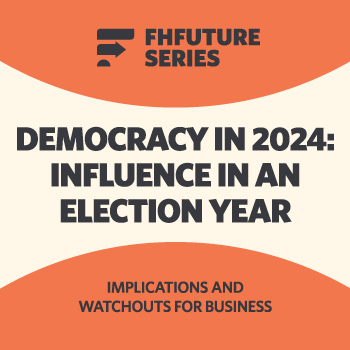Why We Need a Physical Activity Revolution
Public opinion is changing. The role of physical activity and sport in ensuring a healthy and balanced life is now, finally, being heavily pushed in the media, by Public Health England, and the Department for Culture, Media and Sport.
We like to think the tipping point was the All-Party Commission on Physical Activity. Established in the Autumn of 2013, the Commission heard from nearly 200 organisations and individuals across six evidence sessions and written submissions.
The report “Tackling Physical Inactivity – A coordinated approach” called for a national plan to combat the physical inactivity crisis that is engulfing the UK.
FleishmanHillard were very proud to act as the secretariat to the Commission, and only too happy to see the media and other stakeholders picking up on some of the recommendations within the report.
During the Commission, the Government released its own document on physical activity – ‘Moving More Living More’ – and Public Health England announced it would place physical activity at the foundation of their framework for 2014.
Indeed just this week the Health Select Committee has released its report following their inquiry into the impact of physical activity and diet on health. Their main recommendation? The benefits of physical activity need to be ‘clearly communicated’, not just when focusing on how it can tackle obesity.
These are all tangible and encouraging developments. The notion that increasing physical activity can benefit your whole life, not just make you fit, is starting to gain significant political buy-in.
But are we being bold and ambitious enough?
Last month Sport England released its latest Active People Survey. It’s headline was that the nation’s most popular sport – swimming – has suffered a significant drop in the number of people getting in the pool on a regular basis. The survey also showed that 125,100 fewer people did some kind of sport once a week for 30 minutes between October 2013 and October 2014. However the accompanying press release said the number of people in England who regularly take part in sport is rising. They point to the fact that, in the year up to October 2014, 15.6 million people aged 16 years and over in England played sport at least once a week, saying this was an increase of 1.6 million since 2005/6 – the first year of the survey.
In the same vein, this week’s Health Select Committee report calls for an end to physical inactivity. It uses the PHE definition of inactivity, less than 30 minutes a week, as its rule.
Yet these measurement tools leave a lot to be desired.
Statistics focusing on those doing at least 30 minutes of exercise at least once a week are, at best, weak. When you consider official guidelines from NHS Choices promoting around 30 minutes of exercise every day, and the recent Nike campaign encouraging moving ‘1 hour’ each day, undertaking one 30 minute unit of exercise a week falls well short of what is beneficial.
We need the Government and media in particular to shine an even greater spotlight on the benefits of sport and physical activity.
We need more campaigns like the recent phenomenally successful Sport England one – ‘ThisGirlCan’.
In addition, the Commission heard that GPs should be given the confidence to prescribe physical activity in thousands of cases they are confronted with. Indeed, the Director of Public Health England, Professor Kevin Fenton, said last year, “I don’t think people understand that physical activity is the miracle cure we’ve been waiting for”.
There is no doubt that this is revolutionary talk. But then again, to see such urgent change, that is exactly what we need – a revolution.
Just as the Designed to Move report argued, real change requires a revolution in our schools, a revolution in our workplaces and a revolution in our cities.
We at FleishmanHillard are on board, holding a Fit and Healthy week late last year and a wellness day every month.
The benefits of physical activity to us as individuals and to us as a society are clear – now’s the time to run with this together.
Find Out More
-
Democracy in 2024: Influence in an election year
May 2, 2024
-
Platinum CMS Award
March 13, 2024


